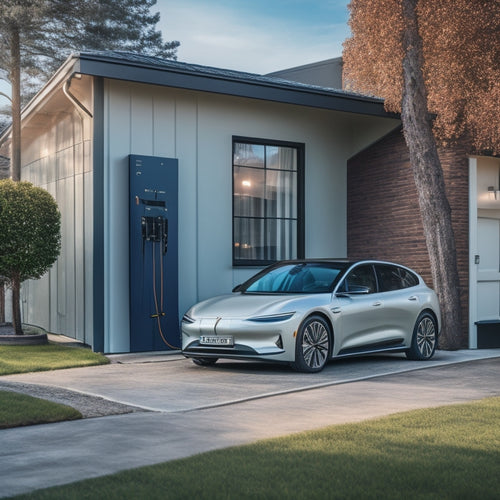
Solar Panels Differences in Various Solar Panels Brands
Share
When comparing solar panels from different brands, you'll notice significant differences in efficiency, price, warranty, and features. Top-tier brands like SunPower and Panasonic offer high-efficiency monocrystalline models, while budget-friendly options like Hanwha and LONGi prioritize affordability. You'll find that premium brands come at a higher cost, with prices ranging from $2.50 to $3.50 per watt, whereas mid-range and budget-friendly brands offer more competitive pricing. As you investigate further, you'll uncover varying warranty lengths, unique features like bifacial panels, and diverse certifications that impact performance, durability, and sustainability - and you're just scratching the surface of what sets each brand apart.
Key Takeaways
- Monocrystalline panels, led by SunPower and Panasonic, outperform polycrystalline panels in efficiency, with up to 22.8% efficiency compared to 20.4%.
- Solar panel prices vary widely among brands, with premium brands like Tesla and Panasonic ranging from $2.50 to $3.50 per watt and budget-friendly brands below $1.80 per watt.
- Warranty lengths and durability differ among brands, with longer warranties indicating manufacturer confidence in product durability and build quality.
- Unique features and technologies, such as bifacial panels and advanced temperature control systems, can maximize energy output and minimize environmental impact.
- Certifications and compliance standards, like UL and IEC, ensure safety, efficiency, and sustainability, enhancing consumer trust in solar panel brands.
Brand Comparisons by Efficiency
Top-tier solar panel manufacturers typically boast high-efficiency models, with some brands pushing the limits of energy conversion. You're likely wondering which brands lead the pack.
Let's explore a comparison of brand performance, focusing on monocrystalline vs. polycrystalline panels.
Monocrystalline panels, made from a single crystal of silicon, generally outperform polycrystalline panels, which are composed of multiple crystals. This difference in structure translates to higher efficiency rates, with monocrystalline panels reaching up to 22.8% efficiency.
Polycrystalline panels, on the other hand, typically peak at around 20.4%.
When examining brand performance, you'll find that industry leaders like SunPower and Panasonic offer high-efficiency monocrystalline models. SunPower's X-Series Residential Solar Panels boast an impressive 22.8% efficiency rate, while Panasonic's HIT-240 model reaches 21.8%.
Other top brands, such as Trina Solar and Jinko Solar, offer high-efficiency polycrystalline options.
Price Variations Among Top Brands
Your budget plays a significant role in determining which solar panel brand is the best fit for your needs. The cost of solar panels varies greatly among top brands, and understanding these price differences is essential in making an informed decision.
When evaluating the cost of solar panels, you should consider various cost factors, including the type and quality of materials used, manufacturing process, and installation costs.
Market trends also influence the pricing of solar panels. For instance, the rise of renewable energy sources has led to increased competition, resulting in lower prices for solar panels. Additionally, government incentives and tax credits can reduce the overall cost of solar panels, making them more affordable for you.
Top brands like Tesla, SunPower, and Panasonic offer premium solar panels with higher price tags, typically ranging from $2.50 to $3.50 per watt.
Mid-range brands like Trina, Jinko, and Canadian Solar offer more affordable options, priced between $1.80 and $2.80 per watt.
Budget-friendly brands like Hanwha and LONGi offer the most affordable options, priced below $1.80 per watt.
Warranty and Durability Differences
How vital is a solar panel's warranty and durability to your investment? You want to guarantee your solar panel system provides long-term performance and returns on your investment. Warranty and durability differences among solar panel brands can greatly impact your investment's viability.
When evaluating solar panel brands, consider the length of the warranty, typically ranging from 10 to 30 years. A longer warranty period indicates the manufacturer's confidence in their product's performance and durability. Look for brands that offer extensive warranties covering both product and performance guarantees.
Some brands may provide additional installation support, which can be essential in case of system failures or maintenance requirements. Durable solar panels can withstand harsh environmental conditions, guaranteeing consistent energy generation.
Assess the panel's build quality, materials, and certifications, such as UL or IEC. Reputable brands invest in research and development, resulting in high-quality products that can withstand the test of time. By prioritizing warranty and durability, you can maximize your solar panel system's long-term performance and returns.
Unique Features and Technologies
Its unique selling points set a solar panel brand apart from the competition, and its proprietary features can greatly enhance your solar panel system's performance and efficiency.
When you're choosing a solar panel brand, it's crucial to take into account the innovative designs and technologies that set them apart. Some brands offer advanced panel designs that maximize energy output, while others focus on eco-friendly materials that reduce the environmental impact of your solar panel system.
For instance, some brands use bifacial panels that can absorb light from both the front and back sides, increasing energy output by up to 25%.
Others incorporate advanced temperature control systems that optimize energy production in hot climates. Additionally, some brands employ state-of-the-art manufacturing techniques that minimize waste and reduce their carbon footprint.
Certifications and Compliance Standards
When selecting a solar panel brand, verifying the manufacturer meets stringent certifications and compliance standards is paramount. You want to ascertain that the panels you install are safe, efficient, and environmentally friendly.
Look for manufacturers that comply with international safety regulations, such as UL (Underwriters Laboratories) and IEC (International Electrotechnical Commission) standards. These certifications guarantee that the panels meet rigorous testing and inspection criteria, minimizing the risk of electrical shocks, fires, or other hazards.
Moreover, opt for brands that hold environmental certifications, such as ISO 14001 (Environmental Management System) and ISO 50001 (Energy Management System). These certifications demonstrate the manufacturer's commitment to reducing their carbon footprint and promoting sustainable practices throughout their operations.
Frequently Asked Questions
Can I Install Solar Panels Myself to Save Money?
You can install solar panels yourself to save money, but be cautious: a DIY installation requires electrical knowledge and adherence to safety codes; consider cost-saving tips like buying in bulk and opting for a simpler system design.
How Long Does It Take to Pay off the Cost of Solar Panels?
As you capture the sun's energy, you're not just powering your home, but your wallet too. With financing options, your payback period will shine bright, typically ranging from 5-10 years, depending on your location and energy usage.
Do Solar Panels Work During Power Outages or at Night?
You'll be happy to know that solar panels don't produce energy during power outages or at night, but you can still have power with energy storage options like batteries, which store excess energy generated by your solar panel functionality during the day.
Can I Use Solar Panels to Charge My Electric Vehicle?
While darkness falls, you're wondering if solar power can fuel your electric vehicle; yes, you can utilize solar energy to charge your EV, leveraging solar charging systems that convert sunlight into electricity, powering your ride sustainably.
Are Solar Panels Resistant to Hail and Extreme Weather?
You'll be relieved to know that most solar panels are designed with hail resistance in mind, capable of withstanding extreme weather conditions like heavy rain, strong winds, and even hailstones up to 1 inch in diameter.
Related Posts
-

Essential Accessories for Heavy Riders of E-Bikes
As a heavy rider of an e-bike, you need specialized gear that caters to your unique needs. Start with safety essentia...
-

5 Essential Tips for Buying EV Charging Systems Online
When purchasing an EV charging system online, you'll want to make sure you're making an informed decision. First, det...
-

What Role Do Unicycles Play in Urban Transport?
As you navigate through congested city streets, unicycles emerge as a viable solution, slashing carbon emissions by u...


